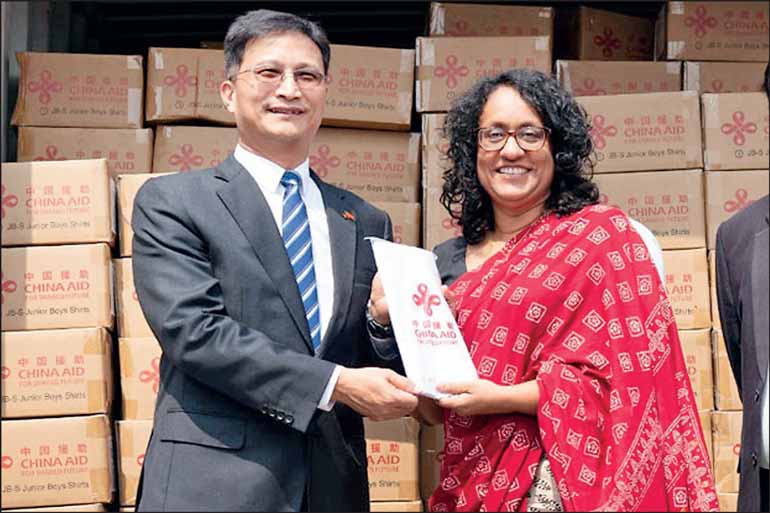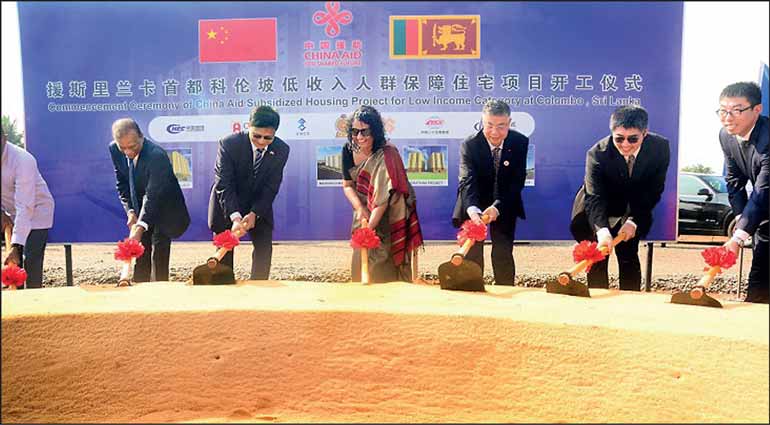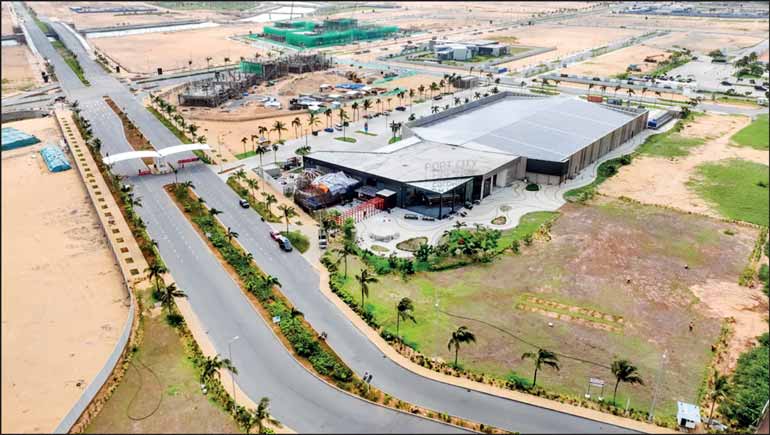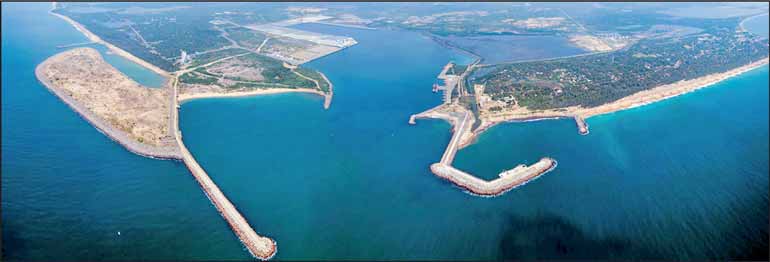Tuesday Feb 24, 2026
Tuesday Feb 24, 2026
Friday, 10 January 2025 00:20 - - {{hitsCtrl.values.hits}}

Chinese Ambassador to Sri Lanka Qi Zhenhong hands over the fabric grant to Prime Minister Dr. Harini Amarasuriya

Inauguration of the first phase of a housing project funded by China

Sri Lanka Duty-Free Mall at Port City Colombo

$ 25 m project at Hambantota International Port’s industrial park
 Sri Lanka’s President Anura Kumara Dissanayake (AKD) is scheduled to visit China mid-January, making it his second international trip following his recent visit to New Delhi. The timing of this visit, coming shortly after Dissanayake’s engagement with India, underscores his administration’s commitment to fostering strong relationships with both regional powers.
Sri Lanka’s President Anura Kumara Dissanayake (AKD) is scheduled to visit China mid-January, making it his second international trip following his recent visit to New Delhi. The timing of this visit, coming shortly after Dissanayake’s engagement with India, underscores his administration’s commitment to fostering strong relationships with both regional powers.
AKD is expected to seek fruitful cooperation and tangible outcomes from his trip to China, as he faces mounting pressure to deliver immediate benefits to his people. Many of the promises he made during his election campaign remain unfulfilled and have so far only been words. The majority of those who voted for the AKD Government expected it to address the rising cost of living. However, despite these high expectations, tangible benefits such as lower prices and reduced living costs have yet to materialise.
It appears that AKD did not achieve his anticipated outcomes from his recent visit to New Delhi. He may have hoped to secure grants to support the national Budget and alleviate the cost of living. However, the inexperienced President must recognise that grants are rarely offered without concrete agreements or deals in place.
Historically, Sri Lankan Governments have relied on providing free or subsidised goods such as rice, fuel, medicine, and fertiliser, creating a culture where such handouts are viewed as essential. This has led to disappointment among some citizens who were expecting immediate relief.
The ongoing shortages of essential items like rice and salt serve as a clear message to the Government: a country cannot be managed in the way they have been thinking for decades. Simply implementing price controls is not a viable solution and will not achieve the desired results. Rather than focusing solely on immediate issues, the government must immediately prioritise comprehensive economic reforms to stabilise the economy and address the root causes of these challenges.
Significant groundwork to cover
This highlights that the inexperienced Government has significant groundwork to cover. If the current administration continues down the same path of subsidising essential goods and implementing tax cuts without focusing on a long-term strategic vision, it risks repeating the mistakes of the Gotabaya Rajapaksa administration. Relying solely on the strength of a parliamentary majority offers little value when faced with a dissatisfied population.
In its election manifesto, the AKD government promised to tackle the cost of living from day one. The current situation may be a result of their inexperience in governance or perhaps unrealistic promises made to secure votes. This has led to further disappointment among the public. Nevertheless, it is important to remain patient and allow the government time to address these challenges.
However, it is now crucial for the Government to be transparent with the people, acknowledge the difficulties, and present a clear plan for a sustainable future. Running the country on a deficit is not a viable long-term strategy, and Sri Lanka cannot afford to repeat the mistakes of the past.
During his visit to China, AKD will focus on securing investments in infrastructure, which have been stalled due to the economic collapse, as well as the manufacturing sector, which has remained undiversified for decades. Additionally, China’s expertise in areas such as agriculture, aquaculture, and Micro, Small, and Medium Enterprises (MSMEs) could be highly beneficial to Sri Lanka’s development.
The Government also aims to leverage China’s knowledge in technology and innovation to strengthen local industries, including agriculture, manufacturing, and tourism. With the right strategies in place, the Belt and Road Initiative (BRI) could continue to be a cornerstone of Sri Lanka’s economic revival, helping the country overcome its recent challenges and laying the foundation for a prosperous future.
Sri Lanka has significant potential to increase its agricultural exports, but achieving this will require advancements in agricultural technology. Collaborating with China in this sector could play a key role in realising this potential and driving economic growth.
A recent notable example of successful Chinese investment is the $ 25 million investment in Comfort Mattress Lanka at the Hambantota International Port’s industrial park. This project involves the construction of a 62,000-square-meter factory dedicated to sponge mattress manufacturing and processing. Additionally, a $ 41 million investment in crane technology at Hambantota International Port (HIP) will expand the port’s capacity to handle up to 1 million TEUs. These investments are significant, and AKD is expected to seek further similar investments to help make Sri Lanka more sustainable and reduce its budget deficit.
Sri Lanka has also received a grant of 11.28 million meters of fabric from China, which will be used to provide school uniforms for 2025. Furthermore, the country has inaugurated the first phase of a housing project funded by Chinese financial assistance amounting to Rs. 22 billion.
Sri Lanka was one of the first countries to openly support China’s Belt and Road Initiative (BRI) when it was launched in 2013. This partnership has contributed significantly to Sri Lanka’s economy through massive infrastructure development, foreign investments, and job creation. Landmark projects such as the Colombo Port City and the Hambantota Port are prime examples of the transformative impact of BRI initiatives in the country.
Focusing on sustainable and mutually beneficial projects
The new Government remains committed to strengthening its partnership with China under the BRI framework, recognising its potential to further enhance Sri Lanka’s economic resilience and development. By focusing on sustainable and mutually beneficial projects, the Government aims to attract more BRI-related investments that align with the nation’s long-term goals, particularly in sectors like transportation, energy, and digital infrastructure.
China has expressed its continued support for Sri Lanka. China stands ready to maintain the momentum of high-level interactions with Sri Lanka, carry forward traditional friendship, and expand exchange and cooperation in various fields to deliver more tangible benefits for both nations.
The Government also emphasised that Sri Lanka aims to maintain balanced diplomatic relations with all countries, reaffirming that no nation is given special treatment. Under AKD’s leadership, if Sri Lanka can collaborate effectively with both China and India, maintaining balanced relations could be a game changer.
This approach is crucial for a small economy like Sri Lanka’s in today’s complex geopolitical environment. However, the question remains: how far can this inexperienced Government and its President withstand pressure from powerful nations?
In this challenging geopolitical climate, Sri Lanka must carefully safeguard its sovereignty while pursuing sustainable development and balanced relationships with global powers. Sri Lanka’s past actions highlight the challenges of maintaining such balance. For instance, the Government previously made controversial decisions, such as rejecting the hybrid energy project planned for three islands off the Jaffna Peninsula due to “security concerns” raised by a third party. Similarly, Chinese research vessels were reportedly banned from entering Sri Lankan ports.
Recently, the government announced Sri Lanka’s intention to apply for BRICS membership and join the affiliated New Development Bank (NDB). These are promising developments, but they will likely attract significant pressure from the US and its Western allies, who may push Sri Lanka to align with their interests—even when such decisions might not benefit the country.
For example, last year, the US sanctioned an Indian firm that was part of a consortium with a Russian firm managing Sri Lanka’s Mattala Airport. More recently, India’s Adani Group withdrew its request for a US government-backed loan to construct the Colombo West International Terminal at the Port of Colombo after facing allegations from the US about compliance practices at Adani Green Energy—allegations the group has denied as “baseless.” Fortunately, Adani Group decided to proceed with the project using internal financing.
The recent positive developments in China-India relations are particularly significant for small Global South countries like Sri Lanka. If Sri Lanka can collaborate effectively with both China and India, maintaining balanced relations could be a game changer. At the same time, both China and India recognise the importance of supporting Sri Lanka to navigate the West’s hidden agendas. Their support in Sri Lanka’s development could bolster its leadership role among Global South nations.
China and India can jointly help Sri Lanka develop its economy. The improvement in China-India relations is a win-win for not only those two nations but also the expanded BRICS members and the Global South as a whole.
However, we need to wait and see whether this inexperienced government is truly fit for purpose. Failing to reduce the cost of living is already causing a loss of popularity, and this trend will only further diminish the government’s standing.
(The writer currently serves as a Director of BRISL, an independent and pioneering Sri Lankan-led organisation, with strong expertise in BRI advice and support. Maya can be contacted at: [email protected].)